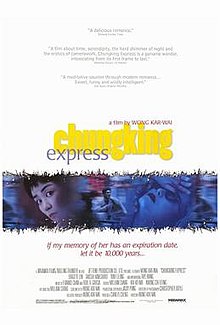| Chungking Express | |||||||||||
|---|---|---|---|---|---|---|---|---|---|---|---|
 US theatrical release poster | |||||||||||
| Chinese name | |||||||||||
| Traditional Chinese | 重慶森林 | ||||||||||
| Simplified Chinese | 重庆森林 | ||||||||||
| Literal meaning | Chungking (Chongqing) Forest | ||||||||||
| |||||||||||
| Directed by | Wong Kar-wai | ||||||||||
| Written by | Wong Kar-wai | ||||||||||
| Produced by |
| ||||||||||
| Starring | |||||||||||
| Cinematography | |||||||||||
| Edited by |
| ||||||||||
| Music by |
| ||||||||||
Production companies | Jet Tone Production Co., Ltd. | ||||||||||
Release date |
| ||||||||||
Running time | 98 minutes | ||||||||||
| Country | Hong Kong | ||||||||||
| Languages | Cantonese[3] Mandarin | ||||||||||
| Box office | |||||||||||
Chungking Express is a 1994 Hong Kong arthouse[5] romantic comedy-drama film written and directed by Wong Kar-wai.[6][7] The film consists of two stories told in sequence, each about a lovesick Hong Kong policeman mulling over his relationship with a woman. The first story stars Takeshi Kaneshiro as a cop obsessed by his breakup with a woman named May, and his encounter with a mysterious drug smuggler (Brigitte Lin). The second stars Tony Leung as a police officer roused from his gloom over the loss of his flight attendant girlfriend (Valerie Chow) by the attentions of a quirky snack bar worker (Faye Wong).[8]
"Chungking" in the title refers to Chungking Mansions in Tsim Sha Tsui, Hong Kong, a place with a reputation as a dark underbelly rife with crime, sex and drugs.[9] "Express" refers to the food stand Midnight Express, located in Lan Kwai Fong, an area in Central, Hong Kong.[10][11]
The film premiered at Hong Kong on 14 July 1994 and received critical acclaim specially for its direction, cinematography and cast performances. Since then it has been regarded as one of Wong's finest works, one of the best films of 1994, of the 1990s, of the 20th century and of all time, as well as one of the best anthologies and romantic comedies ever made.
In 2022, the film appeared at number 88 on the decennial Sight and Sound critics' poll of the greatest films of all time.[12]
- ^ "Chungking Express" end credit (Miramax/Criterion version) (DVD/Blu-ray). Miramax/Criterion.
- ^ a b "Chungking Express". Hong Kong Film Archive. Archived from the original on 18 December 2012. Retrieved 3 February 2012.
- ^ "Chungking Express". BBFC. Archived from the original on 22 September 2024. Retrieved 9 August 2021.
- ^ "Chunking Express". Box Office Mojo. Archived from the original on 21 November 2011. Retrieved 3 February 2012.
- ^ Ebert, Roger. "Chungking Express (1994)". Chicago Sun-Times. Archived from the original on 14 April 2021. Retrieved 25 March 2024 – via RogerEbert.com.
- ^ Blaise, Judd. "Chungking Express (1994)". AllMovie. Archived from the original on 24 May 2012. Retrieved 11 January 2013.
- ^ "The Cinematheque / Chungking Express". Archived from the original on 29 November 2020. Retrieved 23 January 2021.
- ^ "10 iconic looks in Asian cinema, including that Bruce Lee jumpsuit". South China Morning Post. 14 March 2024. Archived from the original on 24 March 2024. Retrieved 24 March 2024.
- ^ "Then and Now: Iconic locations from Wong Kar-wai's Chungking Express". Time Out. Archived from the original on 10 November 2022. Retrieved 9 October 2024.
- ^ "Poet of time: Wong Kar-Wai on Chungking Express | from the Sight & Sound archive". British Film Institute. 21 May 2020. Archived from the original on 9 August 2022. Retrieved 9 August 2022.
- ^ "Then and Now: Iconic locations from Wong Kar-wai's Chungking Express". Time Out Hong Kong. Archived from the original on 3 March 2021. Retrieved 9 August 2022.
- ^ "Chungking Express (1994)". British Film Institute. Archived from the original on 22 September 2024. Retrieved 2 December 2022.